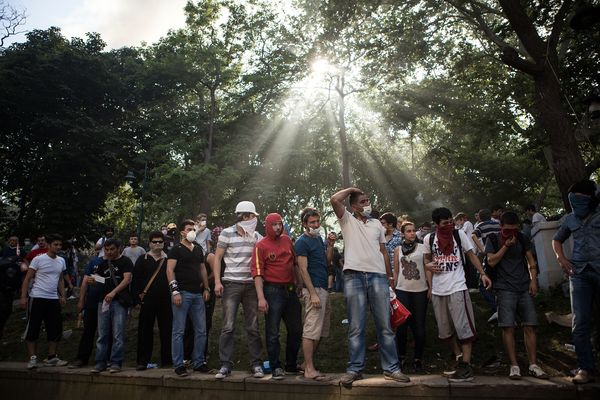Contesting Development

The people throughout the Middle East/North Africa have been compelled to take to the streets and squares of many towns and cities to contest the public space and those who claim authority over it.
These ripples from the neighborhoods have accumulated to reach the palaces of power in great waves, variously questioning and reclaiming the public space as a metaphor for their will to replace the dominant rule over public affairs, in general.
This issue of Land Times reports on the parallel struggles over ideas and territory that call for democratic governance and democratic space.
In doing so, it is indispensable to reveal the ideological root causes.
In the course of that analysis, the links across regions to seemingly distant events are inescapable and give a popular meaning to globalism and globalization.
In a Regional Development, a public/private initiative to profit from an iconic public space in Istanbul has epitomized the neoliberal development paradigm and crony capitalism of the ruling party in Turkey. The article “Local Gezi Park Goes Global” makes the case of the people’s challenge to the imposed model of development and skewed government priorities, precisely while the same anti-neoliberal message echoes on the streets of far-away Brazil.
The promised changes in treatment of Egypt’s peasants, along with other democratic hopes, have been dashed by the government that gullible voters elected to the presidency in 2011.
That disaffection has led to a dramatic and tragically bloody turn of events across the country. Meanwhile, old land conflicts risk a revival in the new context, as farmers remain exposed to violence and larceny without protection of the law and its assigned enforcers, as explained by Bashir Saqr’s report on renewed attacks against Egypt’s small land-holding farmers.
Another model of official “development” concerning the region is the policy of megaprojects in the form of dam construction on the Nile headwaters in Ethiopia, with large-scale displacement for land-based peoples in that country and worries of depleted water supply downstream. “Ethiopia Dams and Destroying Peoples for ‘Development’” reports on this infrastructure construction boom—with its profiting international accomplices—forming only the latest in a historic series of measures that have dispossessed indigenous peoples in Ethiopia and created another round of food insecurity.
Palestinians perceive no let-up in their ongoing Nakba (national catastrophe), with population transfer forming Israel’s raison d’état and the ideological and institutional basis to dispossess them further. “First Palestinian Conference on Population Transfer” reports on the programmatic focus of the Palestinian organization Badil on the continuum and impunity of the practice of population transfer, while HLRN contributes to that discussion by exploring the development of population transfer as international crime, and an essential element of colonialism and colonization.
The ongoing conflict in Syria is not only tragic for its loss of life and property. “Reconstruction Programs in Syria: The Next Conflict” uncovers the current consequences on that conflict, while auguring a future of further contention in the competing reconstruction visions of the dominant contenders.
Meanwhile, the “neoliberal” and “neoconservative” preferences of external parties share a common denominator with the known plans of the Asad regime: a pattern of contempt for the poor. International Developments reported here also reflect a contestation of current development assumptions and the pursuit of policy alternatives.
The UN Special Rapporteur on adequate housing has enlisted global experts in her “Study on Security of Tenure for the Urban Poor,” and the UN Human Rights Council’s Advisory Committee has proposed a study on “Human Rights and Local Government” in its guidance for UN human rights policy.
As a companion to these two articles, international policy successes in protecting land and small-scale in the fight against poverty and hunger are the subject of “Hunger between Production and Political Will.” This issue of Land Times also reports global civil society efforts at the further implementation of human rights standards in the field of economic, social and cultural rights, which form the normative heart of a human right to development.
Pausing to commemorate the 20th anniversary of the pivotal Vienna World Conference on Human Rights (1993), global civil society organizations (CSOs) have taken stock of the achievements and remaining challenges of ensuring the primacy of human rights.
Among the achievements and challenges are those related to applying the extraterritorial obligations (ETOs) of states in the area of human rights, as reflected in the CSO conference declaration. Both important conferences covered here have posed concrete recommendations that doubtless will involve the next twenty years, namely, (1) establishing a World Court of Human Rights where ETOs can be adjudicated and (2) the long-term vision of ensuring the primacy of human rights in foreign policy and international relations. Before accomplishing either of these goals, much more contestation is forseen.
|